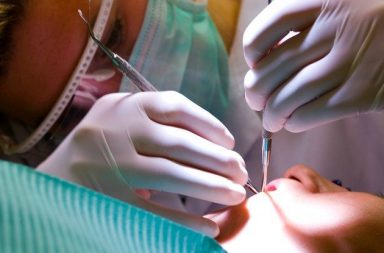Scientists have identified drugs that can renew teeth from the inside out, and may reduce the need for artificial fillings.

This drug has been used in clinical trials on Alzheimer's disease and now appears to improve the ability of natural teeth to heal itself. It works by activating the stem cells inside the center of the pulp of the tooth, pushing the affected area to replenish the solid ivory that forms the majority of the teeth.
"The simplicity of our approach makes it ideal as a clinical product for physiotherapy for large dental cavities, by providing pulp protection and restoring ivory." Said lead author Paul Sharp of King's College in London.
"In addition, the use of drugs tested in clinical trials of Alzheimer's disease provides a real opportunity for this dental treatment to reach clinics quickly."
"The fillings work well, but if teeth are able to fix themselves, it will certainly be a better way. It enables you to regain all the vitality of age. "
Sharp and his team found that they could use the drug Tideglusib to stimulate stem cells inside the teeth to form more ivory more than usual, and renew the whole structure without the need to add any strange substance at all.
In other words, no more stuffing.
So the researchers used Tideglusib on damaged teeth in mice to see how they promote stem cell activation.
The drugs were applied to the cavity using a biodegradable collagen sponge, embedded with Tideglusib molecules, and then the cavity was closed from the inside.
Several weeks later, the team found that the collagen sponge had been damaged and the teeth had returned to form enough ivory to fill the gap.
This process is very similar to the usual cavity filler, but instead of artificial fillers, doctors encourage natural growth of the teeth, leading to healthy teeth in the long term.
"Dentistry is not only about filling and digging, but also about keeping healthy teeth," said Dr. Kevin Schiffen, a biopharmacologist at Birmingham University in the United Kingdom who did not participate in the study.
«I can imagine this method of treatment used in clinics, especially because they are soft and cheap».
Given the fact that until now the technique has been tested only in mice, further research is needed until it is confirmed whether the results can be replicated in humans, so we can not anticipate.
The next team plan is to transfer experiments to rats. If these results are positive, human trials may be very likely.
The good news is that Tideglusib and collagen sponges used in the procedure have passed clinical trials of other treatments successfully, and this is likely to speed up the process if tests reach humans.
This is not the only effort to improve the efficiency of padding - in 2015, another team in the UK announced that they had developed a pulp cover that could be inserted into the teeth to stimulate stem cells and trigger similar ivory growth.
Another study in 2015, this time by researchers in Australia, found that tooth decay can be prevented by raising the concentration of fluoride coating before cavities form, and may reduce the amount of treatment needed if it occurs.
We still have a long way to go before these options become available in our local dental clinics, but researchers are determined to make oral care less fearful in the future. This should be good news for millions of people who fear digging.
The study was published in the scientific reports of Nature.
the source
Sounds like a good dental drug
Downvoting a post can decrease pending rewards and make it less visible. Common reasons:
Submit
thx
Downvoting a post can decrease pending rewards and make it less visible. Common reasons:
Submit
@tag2017 Good post. Very interesting. Upvoted and follow. Please, follow me
Downvoting a post can decrease pending rewards and make it less visible. Common reasons:
Submit
ok thx
Downvoting a post can decrease pending rewards and make it less visible. Common reasons:
Submit
This post has received a 0.77 % upvote from @buildawhale thanks to: @tag2017. Send at least 0.50 SBD to @buildawhale with a post link in the memo field for a portion of the next vote.
To support our daily curation initiative, please vote on my owner, @themarkymark, as a Steem Witness
Downvoting a post can decrease pending rewards and make it less visible. Common reasons:
Submit
thx
Downvoting a post can decrease pending rewards and make it less visible. Common reasons:
Submit
Downvoting a post can decrease pending rewards and make it less visible. Common reasons:
Submit
Nice post, its informative, and I m sure this is good news for people innovation never stop keep inform good thing for people, awating another post from you
Downvoting a post can decrease pending rewards and make it less visible. Common reasons:
Submit
thx
Downvoting a post can decrease pending rewards and make it less visible. Common reasons:
Submit
Resteemed by @resteembot! Good Luck!
Curious?
The @resteembot's introduction post
The @reblogger's introduction post
Get more from @resteembot with the #resteembotsentme initiative
Check out the great posts I already resteemed.
Downvoting a post can decrease pending rewards and make it less visible. Common reasons:
Submit
Very exciting news but unfortunately it may not be in time to save a lot of us from losing our teeth. The sooner the better but great work by those dentist. Thanks for sharing, very interesting.
Downvoting a post can decrease pending rewards and make it less visible. Common reasons:
Submit
thx
Downvoting a post can decrease pending rewards and make it less visible. Common reasons:
Submit